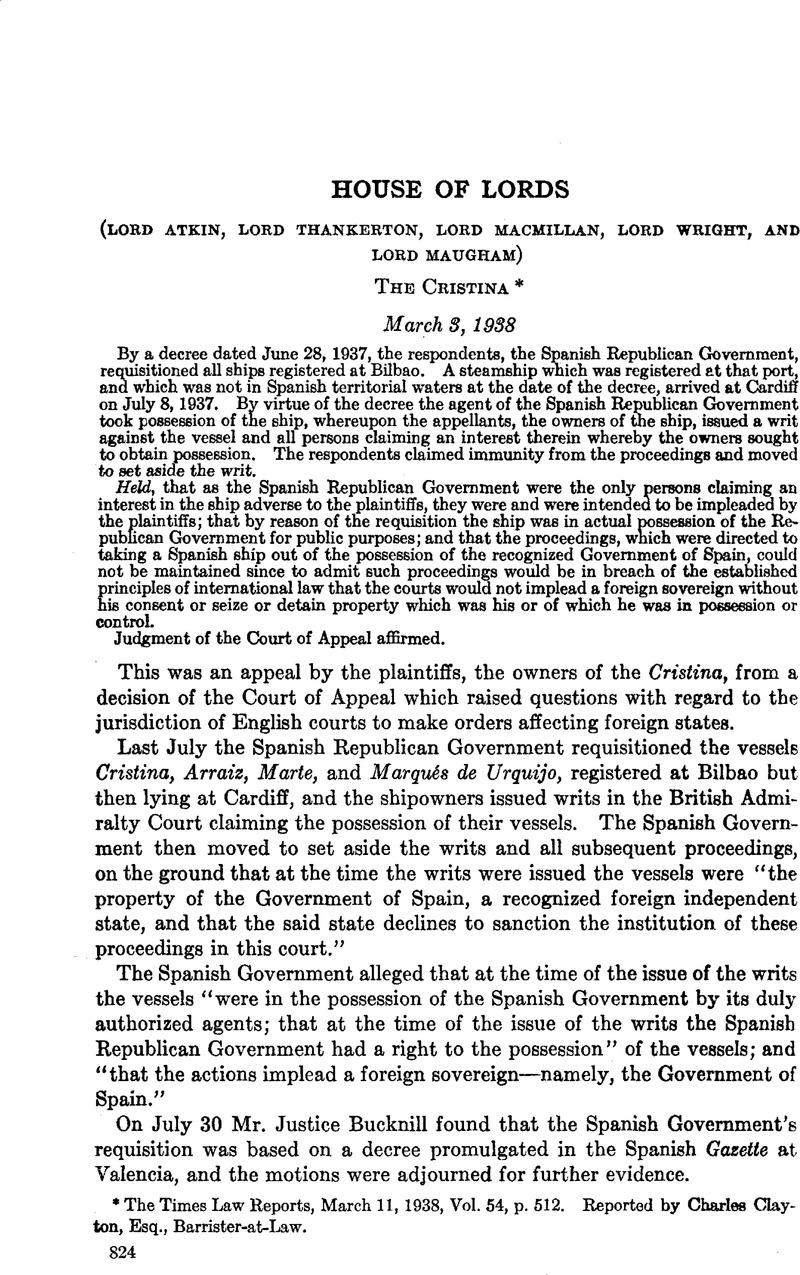Published online by Cambridge University Press: 12 April 2017

* The Times Law Reports, March 11, 1938, Vol. 54, p. 512. Reported by Charles Clayton, Esq., Barrister-at-Law.
* 304 U. S. 126.
1 United States v. Knight, 14 Pet. 301, 315; Gibson v. Chouteau, 13 Wall. 92, 99; United States v. Thompson, 98 U. S. 486, 490; Fink v. O’Neil, 106 U. S. 272, 281.
2 A foreign sovereign as suitor is subject to the local rules of the domestic forum as to costs, Republic of Honduras v. Soto, 112 N. Y. 310; Emperor of Brazil v. Robinson, 5 Dowl. 522; Otho, King of Greece v. Wright, 6 Dowl. 12; The Beatrice, 36 L. J. Adm. 10; Queen of Holland v. Drukker, (1928) Ch. 877, 884, although the local sovereign does not pay costs. United States v. Verdier, 164 U. S. 213, 219. The foreign sovereign suing as a plaintiff must give discovery. Rothschild v. Queen of Portugal, 3 Y. & C. Ex. 594, 596; United States v. Wagner, L. R. 2 Ch. App. 582, 592, 595; Prioleau v. United States, L. R. 2 Eq. 659. A foreign sovereign plaintiff “should so far as the thing can be done be put in the same position as a body corporate.” Republic of Costa Rica v. Erlanger, L. R. 1 Ch. D. 171, 174; Republic of Peru v. Weguelin, L. R. 20 Eq. 140, 141; cf. King of Spain v. Hullett, 7 Bligh N. S. 359, 392.
3 The presumption of a grant by lapse of time will be indulged against the domestic sovereign. United States v. Chaves, 159 U. S. 452, 464. The rule nullum tempus has never been extended to agencies or grantees of the local sovereign such as municipalities, county boards, school districts and the like. Metropolitan R. Co. v. District of Columbia, 132 U. S. 1; Boone County v. Burlington and M. R. R. Co., 139 U. S. 634, 693. It has been held not to relieve the sovereign from giving the notice required by local law to charge endorsers of negotiable paper, United States v. Barker, 12 Wheat. 559; cf. Cooke v. United States, 91 U. S. 389, 398; Wilber National Bank v. United States, 294 U. S. 120, 124, and in tax cases has been narrowly construed against the domestic sovereign. Bowers v. New York & Albany Lighterage Co., 273 U. S. 346, 350. Compare United States v. Knight, 14 Pet. 301; Fink v. O’Neil, 106 U. S. 272.
4 The United States accorded recognition to the Provisional Government March 16, 1917, and continued to recognize it until November 16, 1933, when the Soviet Government was recognized. During that period the United States declined to recognize the Soviet Government or to receive its accredited representative, and so certified in litigations pending in the federal courts. The Penza, supra; The Rogdai, supra. It recognized Mr. Bakhmeteff as Russian Ambassador from July 6, 1917, until June 30, 1922, when he retired, having designated Mr. Ughet as custodian of Russian property in the United States. Mr. Ughet, after his appointment as Financial Attaché April 7, 1917, continued to be recognized as such by the United States until November 16, 1933. He was recognized by the United States as Chargé d’Affaires ad interim, during the absence of the Ambassador from December 3, 1918, to July 31, 1919. Their diplomatic status as stated was certified in the present suit by the Secretary of State, who stated that he considered Mr. Ughet’s status unaffected by the termination of the Ambassador’s duties.
Their status was certified to by the Department on October 31, 1918, and July 2, 1919, respectively, in Lehigh Valley Railroad Co. v. State of Russia, 293 Fed. 133. Mr. Bakhmeteff’s status as Ambassador was certified May 18, 1919, in Agency of Canadian Car & Foundry Co. v. American Can Co., 258 Fed. 363, 368; on April 6, 1920 in The Rogdai, 278 Fed. 294, 295; on June 24, 1919, in The Penza, 277 Fed. 91, 93. Certificate with respect to both Mr. Bakhmeteff and Mr. Ughet was given February 19, 1923, and with respect to Mr. Ughet December 22, 1927. On the faith of the two last mentioned certificates the Court, in the Lehigh Valley Railroad case, supra, as stated by the Government’s brief in the present case, ordered to be paid to Mr. Ughet approximately $1,000,000, of which more than $700,000 was paid to the United States Treasurer “on account of interest due on obligations of the Provisional Government of Russia by the Treasurer.”
5 Russian Government v. Lehigh Valley R. Co., 293 Fed. 133; 293 Fed 135, aff’d 21 F. (2d) 396; State of Russia v. Bankers Trust Co., 4 F. Supp. 417, 419, aff’d 83 F. (2d) 236. See also Agency of Canadian Car & Foundry Co. v. American Can Company, 258 Fed. 363.